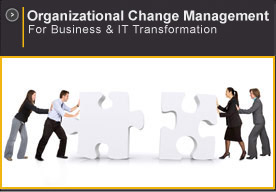OCM Training
 OTA offers a series of OCM training seminars for change agents, project team members, executives and consultants. These seminars walk the participants through the activities and deliverables of OTA’s OCM Methodology.
OTA offers a series of OCM training seminars for change agents, project team members, executives and consultants. These seminars walk the participants through the activities and deliverables of OTA’s OCM Methodology.These seminars, which focus on the change challenges facing the participants, transfer versatile organizational change management skills, building a critical competency for today's rapidly evolving business environment. Facilitated by our most experienced practitioners, these interactive workshops help build commitment around the project's change objectives and deliverables.
An Organizational Change Management (OCM) certification program, used to certify OTA consultants, is available for customers who wish to build up their internal change management capabilities.
To view OTA’s OCM training curriculum: click here. (Click on the seminar title to see a brief description)
Detailed outlines can be obtained by communicating with OTA at : info@ota.ca
To view our SAP-specific OCM training curriculum: click here.
OCM Training Curriculum
- Executive Workshop
(An overview of ERP Solutions and their organizational implications) - Governance & Management of ERP Projects
(Workshop for Executives and Management Teams) - Organizational Change Management
(Building readiness for value realization) - IT Change Agent Skills & Methods
(Managing the human and organizational dimensions of IT implementations) - IT Business Impact Analysis
(Understanding business impacts and how they will reshape the organization)
SEMINAR DESCRIPTIONS:
Executive Workshop (1/2 or 1 day)
Description
This one-day workshop helps executives and senior managers gain a strategic and practical understanding of ERP Solutions.
Key features, benefits and potential impacts are highlighted.
The workshop also introduces the role that executive teams play in the successful governance of an ERP project.
Intended as an interactive presentation, this session is facilitated by a strategic change management professional from OTA that can describe the multiple facets of an ERP Solution.
Objectives
- Describe how ERP Solutions can address key business issues
- Lay the grounds for a governance coalition within the management team
- Help set common expectations at the executive level
Seminar Outcomes
- Strategic perspective on an ERP Solution
- Impacts and benefits of the application of ERP technology on business processes
- An understanding of the key role of executives in the implementation
- A common ground for all to share the vision to the operational level of the organization
Governance & Management of ERP Projects (3 days)
Description
This seminar provides executives, senior managers and project management teams with an understanding of best practices on ERP implementation governance, project/risk management and value/change realization. These three areas are covered at a high level in day 1, while days 2 and 3 focus on the methodology, tools and techniques for project realization.
Emphasis is on the roles and responsibilities of all project stakeholders when applying the ERP implementation methodology. Workshops on common risks (i.e. decision making, requirements definition, management of stakeholder expectations, organizational change) allow participants to discuss preventive and corrective actions relevant to their own project. Intended as an interactive session, this workshop is facilitated by a strategic business consultant from OTA.
Objectives
Executives (Day 1 only)- Become familiar with governance best practices for ERP project guidance and oversight
- Understand how to ensure that project activities support business transformation and value realization goals
Executives and Senior Managers (Days 1 & 2)
- High level understanding of the work packages and resource requirements of each phase of the project
- Become familiar with recommended risk mitigation strategies for each phase of the project
Project Directors, Leads (Days 1, 2 & 3)
- Learn to navigate through ERP implementation support tools, methodology and accelerators
- Gather a list of action items for project execution
Seminar Outcomes
- Linking the organizational layers, from strategic to operational, on a common core focus for an ERP implementation
- Generating “buy-in” from all levels of management. Developing consensus about the purpose, process and roles for a successful ERP implementation
- Establishing an operational “road map” as the basis for the planning cycle at all organizational levels
Organizational Change Management (2 days)
Description
Experience shows that successful change management initiatives focus on value realization and measurement. This seminar introduces tools and accelerators to help project teams address two significant implementation challenges:
- Aligning diverse stakeholders on a common set of value goals, from initial justification through implementation
and operations.
- Managing the business impacts and organizational changes necessary to the realization of value goals.
Participants receive accelerators and templates to support the planning and execution of communications, impact analysis, decision-making and transition planning activities.
Objectives
- Help project teams accelerate stakeholder alignment and buy-in
- Improve the effectiveness of organizational change management resources
- Apply reusable templates and accelerators for business impact analysis and transition planning
- Mitigate the risk of not achieving expected benefits from the ERP investment
- Improve decision-making and issue resolution
Seminar Outcomes
- Understanding the stakeholders, and their positions, so that you can communicate with each group from their frame of reference
- The ability to know what changes are needed (based on business impact), and the ability to link the changes to common value goals for all stakeholders
- The skill to facilitate the process of getting others to adapt to change and the ability to accelerate the adoption process
IT Change Agent Skills & Methods (3 days)
Description
Managing the “people” aspects of IT and e-business initiatives are one of the greatest challenges facing implementation teams.
Drawing from lessons learned in multiple implementations in a variety of sectors, this seminar introduces proven techniques and skills for developing key organizational change management deliverables.
Through examples and simulations, participants learn the techniques and skills needed to assess risk and readiness in each phase, define coalition and communication strategies, as well as how to prevent / defuse resistance.
Objectives
- Understand and apply Organizational Change Management (OCM) deliverables and techniques in IT implementations
- Describe typical organizational impacts of different types of IT solutions
- Describe the steps leading to the adoption of a change
- Identify local driving and restraining forces for your project and assess risks and readiness
- Develop skills to handle and defuse resistance
- Develop an effective communication strategy
- Develop/refine your change management plan
Seminar Outcomes
- Develop the ability to see the symptoms of resistance, diagnose the cause and make a timely intervention
- Develop the skill to communicate effectively with all stakeholders and motivate them toward goal attainment
- An understanding of the process of change and the triggers for resistance.
- Tips and techniques to manage change.
IT Business Impact Analysis (2 days)
Description
A fundamental goal of Information Technology (IT) and e-Business initiatives is the adoption of new business practices and their associated processes, roles and responsibilities. Analyzing these impacts and transitioning the organization represent the bulk of Organizational Change Management (OCM) efforts.
This workshop is intended to allow customers, over time, to act with autonomy. This is achieved by transferring to participants: practical techniques, tools, skills and lessons learned from multiple IT implementations. These allow project team members to effectively engage line managers and contribute to a smooth go-live and benefits realization.
Simulations and case studies help participants perfect their skills and apply the techniques to the real-life challenges they will encounter.
Objectives
- Provide a practical approach to resolving the issues related to transition management
- Identify and understand the impacts triggered by the various IT and communication innovations
- Engage line managers in support of the project’s objectives
- Provide alignment across all organization levels
- Understand the new roles and responsibilities
- Develop the local transition plans
- Monitor and control the transition
Seminar Outcomes
- The acceptance, by key operational personnel, of the re-structuring needed due to implementation impact
- A clear understanding of the expections on personnel and organizations for the successful implementation of the IT solution
- The realization of specific gaps in the essential skill sets which could restrain a successul IT implementation
- The ability to plan and organize for success


